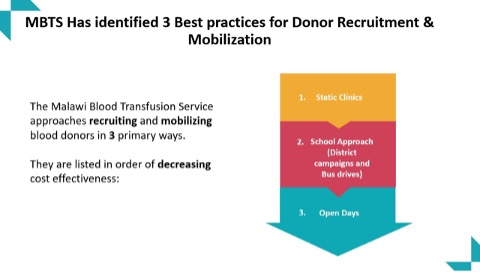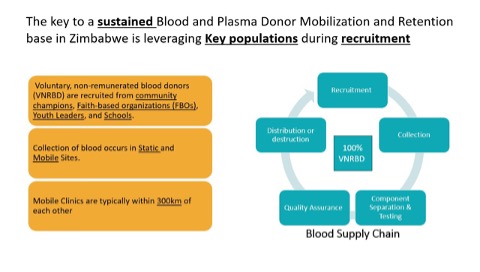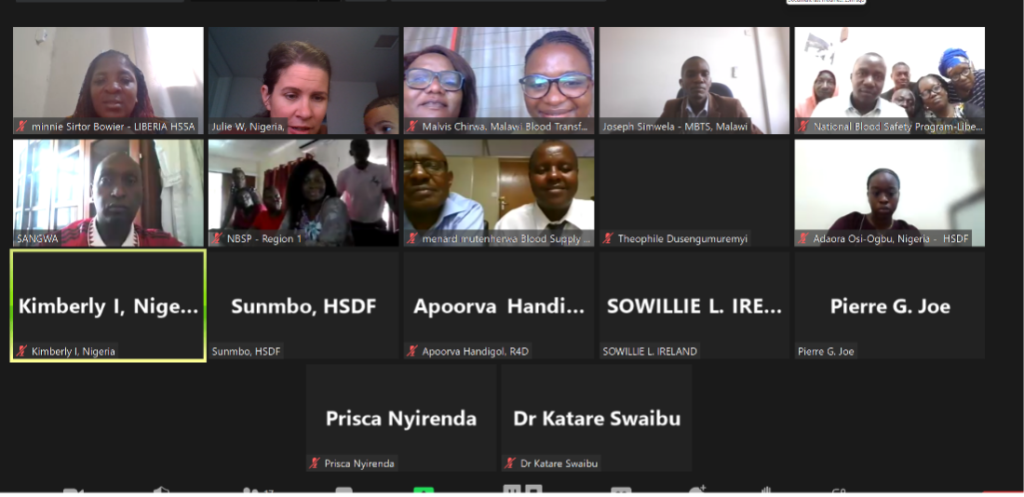First Cross-country Learning Event: Blood Donor Retention and Mobilization 
Access to safe blood continues to be a public health priority worldwide. Most countries rely heavily on blood donations from their population for safe blood supply. Voluntary non-remunerated blood donor recruitment (VNRBD), mobilization and retention is needed to maintain an adequate blood supply. Research has found that blood from voluntary blood donors is safer and has a lower incidence of Transfusion Transmissible Infections (TTI) sero-reactivity compared to donations from friends and other incentivized donors. Typically, blood donors donate blood for altruism, family and loved ones, or because there is incentive1. In low-and middle-income countries (LMICs) especially, innovative strategies must be deployed to spread awareness on the benefits of donating blood and ensure that VNRBDs are consistently donating blood.
On the 8th of November 2023, HSDF, consortium partner in the USAID-funded, the Accelerator consortium facilitated the first of a series of virtual Learning Events for the Accelerator’s ‘Strengthening Safe Blood Systems activity’ in Liberia, Malawi, and Rwanda. A key component of the activity is to organize and facilitate cross-country learning and produce global and local resources on strengthening safe blood systems to expand learning and impact in and beyond the three (3) focus countries: Liberia, Malawi, and Rwanda. This first learning event, entitled: Blood Donor Mobilization and Retention Strategies, had over 30 attendees across all three countries.
The objective of the learning session was to:
- Discuss the current global safe blood and plasma donor trends through global evidence and best practices as well as provide innovative approaches and strategies for long-term sustainability, and
- Identify the challenges and opportunities encountered in community and/or school-based blood drives,
To achieve this, participants were encouraged to:
- Explore effective strategies and approaches for safe blood and plasma donor retention, highlighting voluntary non-renumerated retention strategies; and
- Discuss experiences, best practices and lessons learned in other settings and contexts.
Participants included public relations managers, blood donor managers and other representatives from the three countries’ blood transfusion systems. The dialogue began with an overview of the Accelerator Strengthening Safe Blood Systems activity, and two examples of blood donation and retention strategies. The Malawi case study presented by Mrs. Malvis Chirwa and Mrs. Janet Katonda from the Malawi Blood Transfusion Service (MBTS), demonstrated a framework for a school-based blood donation program, using a three-pronged approach. While Mr. Mernard Mutenherwa from the Zimbabwe National Blood Service (NBSZ) presented evidence-based strategies for the recruitment and mobilization of donors in LMICs. Mr. Mutenherwa spoke on the need for culturally sensitive information to counter misconceptions, safety in testing, as well as the need for target setting and/or quantification of the blood system needs.

In line with MBTS’s three-pronged approach, Malawi primarily focuses on a secondary schools approach, that includes a social media and survey-based beneficiary feedback mechanism. Mrs. Chirwa and Mrs. Katonda explained in detail the process of each strategy (Figure 1), how each of them compared in terms of overall blood supply yield, and the pros and cons associated with each approach, including resources required to implement. From the presentation made by Mr. Mutenherwa of NBSZ, the participants were led through a thorough roadmap to creating a sustainable blood donor base. In Zimbabwe, this is achieved by prioritizing culturally specific donor needs, educating the population on the safety measures taken throughout the blood collection process, and understanding the reasons for reluctance when it comes to donating blood.

The learning event had over 20 participants, of which seven (7) were the Accelerator’s staff. Several National Blood Safety Program (NBSP) stakeholders in Liberia gathered in one conference room in Monrovia and Bong County to participate in the learning session, encouraging them to engage with the information, and each other. The participants from all three blood systems actively engaged the speakers with several specific, pertinent questions that led to robust discussions. Questions were asked around sustainability of the blood donor retention and mobilization strategies, feasibility of obtaining a 100% VNRBD pool, total blood collections for Malawi and Zimbabwe and how to set blood donor targets change and are quantified each year, and how the blood donors were kept incentivized. The level of engagement points to the importance of country-led, demand-driven joint learning – a fundamental element of the learning session. The webinar topic was identified by stakeholders from the 3 focus countries as a crucial thematic area for cross-learning, and problem-solving to drive health systems change in their respective countries.

We are grateful for the active engagement of the participants, presenters, and facilitators. The representatives from all three Blood Transfusion Systems are eager to continue the exchange of knowledge with each other, and share best practices and lessons learned. The next webinar will take place on the 6th of December 2023 on the topic of Hemovigilance, while plans are also being made for an in-person learning session in Rwanda to further the blood donor mobilization strategy discussion with the inclusion of blood plasma exportation expected in early 2024.
Grants and Business Development Specialist
We are seeking a highly motivated and experienced Grants and Business Development Specialist to join our organization. The successful candidate will be responsible for identifying funding opportunities, developing grant proposals, and fostering partnerships with potential donors and stakeholders (regional and global). This role plays a vital part in securing funds and resources to support our organization’s mission and projects.
Apply NowPublic Health Consultant, Guinea
The consultant (working with the Accelerator team) will collect results from the tool, organize a meeting with stakeholders to discuss results from the tool, and produce a report on key findings and recommendations from the tool to be shared publicly.
Apply NowPublic Health Associate, Senegal
We are currently in search of an experienced Public Health professional in Senegal to work on the anticipated Nutrition Capacity Development and Financing Platform and provide technical assistance to elevate nutrition financing and strengthen local capacity to support these efforts. The Associate must be bilingual (English and French).
Apply Now